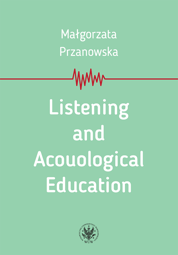Information about a product
| Edition: | 1 |
| Place and year of publication: | Warszawa 2019 |
| Publication language: | angielski |
| ISBN/ISSN: | 978-83-235-3743-4 |
| EAN: | 9788323537434 |
| Number of page: | 306 |
| Size of the file: | 3,65 MB |
| Publication type: | Praca naukowa |
| DOI: | https://doi.org/10.31338/uw.9788323537434 |
The book is devoted to the analysis of the complex phenomenon of listening, with its own specific dynamics. Listening, understood as a way of being in the world, requires an acouological education, in which the logic of creative participation calls for a being with others that is responsible, inspiring, tasteful and that overcomes “reductionisms” in a translational way.
The publication is intended for those interested in the phenomenon of listening, the philosophy of education, contemporary pedagogy, philosophical hermeneutics, as well as the philosophy of music. It could become a source a inspiration for counselling, relations (also in the therapeutic dimension) and communication scholars and professionals.
*********
Książka jest poświęcona analizie wieloaspektowego, posiadającego swoistą dynamikę, fenomenu słuchania. Rozumiane jako sposób bycia w świecie słuchanie wymaga kształtowania akuologicznego (acouological education), w którym logika twórczego uczestnictwa zaprasza do odpowiedzialnego, translacyjnie przekraczającego „redukcjonizmy”, inspirującego i pełnego smaku bycia z innymi.
Publikacja przeznaczona dla osób zainteresowanych fenomenem słuchania, filozofią edukacji, współczesną pedagogiką, hermeneutyką filozoficzną, a także filozofią muzyki. Może stać się inspiracją dla środowisk zajmujących się poradnictwem, relacjami (również w wymiarze terapeutycznym) oraz komunikacją.
The publication is intended for those interested in the phenomenon of listening, the philosophy of education, contemporary pedagogy, philosophical hermeneutics, as well as the philosophy of music. It could become a source a inspiration for counselling, relations (also in the therapeutic dimension) and communication scholars and professionals.
*********
Książka jest poświęcona analizie wieloaspektowego, posiadającego swoistą dynamikę, fenomenu słuchania. Rozumiane jako sposób bycia w świecie słuchanie wymaga kształtowania akuologicznego (acouological education), w którym logika twórczego uczestnictwa zaprasza do odpowiedzialnego, translacyjnie przekraczającego „redukcjonizmy”, inspirującego i pełnego smaku bycia z innymi.
Publikacja przeznaczona dla osób zainteresowanych fenomenem słuchania, filozofią edukacji, współczesną pedagogiką, hermeneutyką filozoficzną, a także filozofią muzyki. Może stać się inspiracją dla środowisk zajmujących się poradnictwem, relacjami (również w wymiarze terapeutycznym) oraz komunikacją.
The book is a very impressive, thoughtful and deep contribution to the fields of hermeneutics and education. The language is poetic, appealing and easy to follow. The examples used are touching and bring the theories to life. The author has a very thorough understanding of the field and finds unique ways to engage the reader with multiple ideas around listening, hermeneutics and education. […] The author’s contribution is also unique in a way as it includes philosophy, psychology, musicology, and education and communicates across the disciplinary boundaries. Important, distinctive and interesting links between thinkers, ideas and disciplines are being made.
Prof. dr hab. Barbara Weber
Małgorzata Przanowska’s book restores to us in our thinking a fascinating resonance of our way of being in the world. It gives voice to the rustling aspect of thoughts, the vibrations of human bodies and the cosmos. The author is interested in the kind of energy that like an image penetrates the mind, but has a greater capacity for transposing movements through the entire substance of a human being. Through assiduous, in-depth and original research that has been expressed precisely, interestingly and clearly, the author develops her studies on hermeneutics, and the Gadamerian approach to it, that are focused on the issue of listening.
Dr hab. Rafał Włodarczyk
This new “listening-based” philosophy of education abandons the prevailing activity-based concept of education which obviously has its own right wherever effectiveness is needed. By contrast, acouological education […] goes back to a layer where activity and passivity do not yet oppose to each other. When listening means understanding, it means self-articulation at the same time. […] We definitely need more education theory of this kind, namely philosophically informed and at the same time dealing not with other theories – but with processes and phenomena which are even closer to ourselves than our normal conceptual thinking.
Prof. dr hab. Philipp Thomas
Prof. dr hab. Barbara Weber
Małgorzata Przanowska’s book restores to us in our thinking a fascinating resonance of our way of being in the world. It gives voice to the rustling aspect of thoughts, the vibrations of human bodies and the cosmos. The author is interested in the kind of energy that like an image penetrates the mind, but has a greater capacity for transposing movements through the entire substance of a human being. Through assiduous, in-depth and original research that has been expressed precisely, interestingly and clearly, the author develops her studies on hermeneutics, and the Gadamerian approach to it, that are focused on the issue of listening.
Dr hab. Rafał Włodarczyk
This new “listening-based” philosophy of education abandons the prevailing activity-based concept of education which obviously has its own right wherever effectiveness is needed. By contrast, acouological education […] goes back to a layer where activity and passivity do not yet oppose to each other. When listening means understanding, it means self-articulation at the same time. […] We definitely need more education theory of this kind, namely philosophically informed and at the same time dealing not with other theories – but with processes and phenomena which are even closer to ourselves than our normal conceptual thinking.
Prof. dr hab. Philipp Thomas
Zobacz również

















